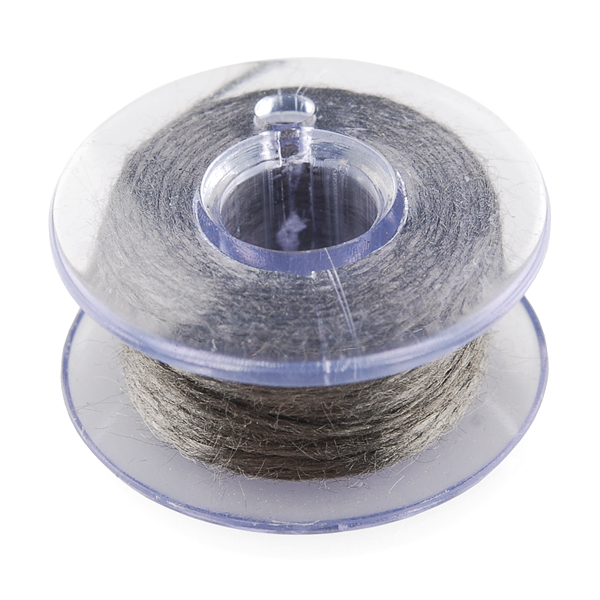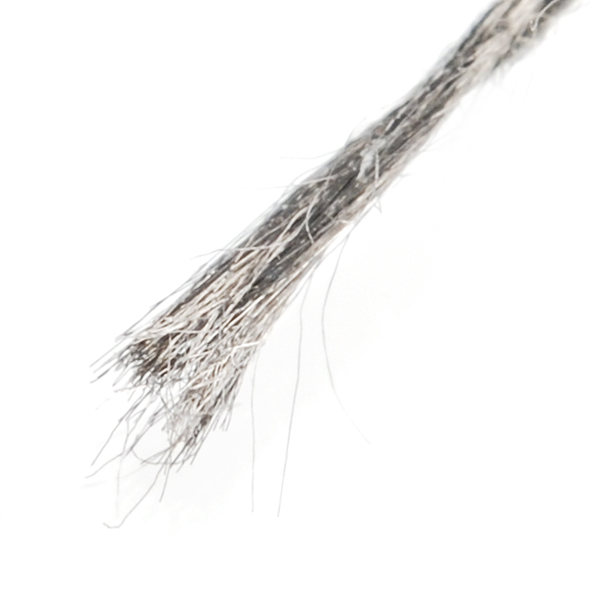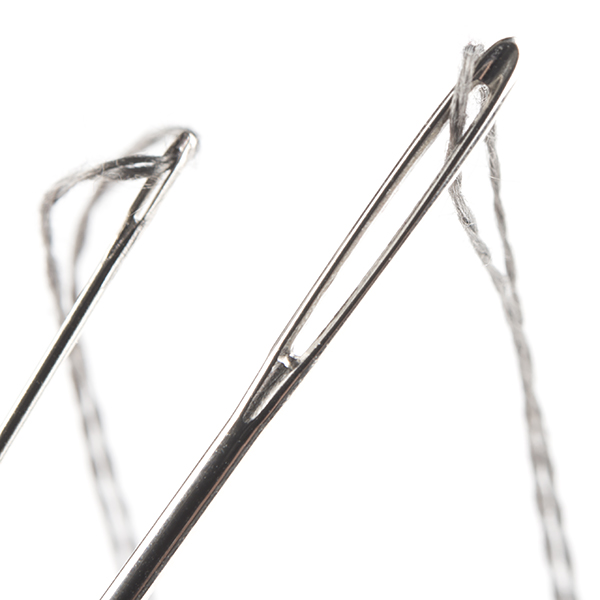Conductive Thread Bobbin - 30ft (Stainless Steel)
This is 30 feet of conductive thread spun from stainless steel fiber and wound on a plastic bobbin. Use it to sew up all of your e-textile projects. This small bobbin is a great way to get into wearable electronics without the upfront cost of buying an entire spool of thread. 30 feet of thread is enough to get a simple design stitched onto your shirt, backpack or hat.
What sets this thread apart from the other conductive thread that we carry is the fact that it's actually spun from this stainless steel fiber and doesn't have a nylon core. This means that while it may not be easy to solder to, because it's stainless, it also won't burn up when you touch it with a soldering iron. Suitable for hand or machine sewing (as a bobbin thread), it's particularly 'toothy', which means that it grabs tight to your fabric- if you've had problems with slippery conductive thread that won't lay flat or knot, this thread will be a welcome relief. We've had no trouble using it for close, tight connections, but if you're worried, waxing the thread should keep it manageable!
- Made from Stainless Steel Fibers
- Resistance: 28 Ohms/Ft
Conductive Thread Bobbin - 30ft (Stainless Steel) Product Help and Resources
LDK Experiment 5: Make Your Own Switch
October 2, 2013
Learn to create and integrate your own handmade switch into an e-textile circuit.
21st Century Fashion Kit: Electrochromatic Circuits
November 5, 2014
Diana Eng walks you through a magically appearing design made with an thermochromatic pigment.
21st Century Fashion Kit: Inflation
December 10, 2014
Learn how to use a blower and thin sheet plastic to create designs that change shape and volume!
Dungeons and Dragons Dice Gauntlet
August 13, 2013
A playful, geeky tutorial for a leather bracer that uses a LilyPad Arduino, LilyPad accelerometer, and seven segment display to roll virtual 4, 6, 8, 10, 12, 20, and 100 side dice for gaming.
Wireless Glove Controller
April 24, 2019
Build a wireless glove controller with Arduinos to trigger an LED using XBees!
LilyPad Basics: E-Sewing
December 17, 2016
Learn how to use conductive thread with LilyPad components.
Wireless Gesture Controlled Robot
April 25, 2019
Control the RedBot wirelessly based on the movement of your hand using an accelerometer, Arduino, and XBees!
Core Skill: DIY
Whether it's for assembling a kit, hacking an enclosure, or creating your own parts; the DIY skill is all about knowing how to use tools and the techniques associated with them.
Skill Level: Noob - Basic assembly is required. You may need to provide your own basic tools like a screwdriver, hammer or scissors. Power tools or custom parts are not required. Instructions will be included and easy to follow. Sewing may be required, but only with included patterns.
See all skill levels
Comments
Looking for answers to technical questions?
We welcome your comments and suggestions below. However, if you are looking for solutions to technical questions please see our Technical Assistance page.
Customer Reviews
4.7 out of 5
Based on 3 ratings:
excellent
quick shipping ... product as described ... works well ... have enough left over for more projects!
Simply works!
... to make touch-capable gloves at very low cost.
Great for wearables
This thread works great in wearable projects and holds its knots a lot better than conductive threads that I've tried from other companies.




Could a strand of this thread be used to make an air-flow sensor? This Elektor project uses filament from an incandescent bulb, but maybe this thread could work? https://twitter.com/Elektor/status/1502585189733699585
Does anyone know the current rating of this thread in amps?
Is this the 2ply or 4ply thread?
I am looking to integrate the heating pads into clothing. Could this safely carry 5-9 volts?
Hey. I was wondering, how consistent is the resistance? Can I use it to measure distance? or the length of the thread? Also, Can you specify some of the mechanical properties of the thread? Breaking load i what interests me the most.
Uriel
This bobbin did NOT have 60 feet of thread. It was more like 30 feet. Half-way through a project I ran out :( - a Larger spool would definitely be helpful.
I'm planning to use this to be my wiring to the One Wire Digital Temperature Sensor - DS18B20 SEN-00245 My idea to use steel wire is that steel is a poor conductor of heat but reasonably low resistance. I want to keep the tiny SEN-00245 isolated from the wires - meaning I don't want my hookup wires acting like a little heat sink. I'll report back how well this works after I get the steel wire in hand, it is on backorder for a week. Having fun, Plinker Craig
big question is can you wash it
unroll & use old fashion silk isolated AM antenna bobine instead of this. This is the cheapest and best solution! Before using it if you would like to you can colour it also...
Which "entire spool" is this a smaller portion of? What is the resistance per foot? I'm very interested in sewing more circuits into clothes, but wonder about washability-- how does this stand up to (gentle) machine washing? Thanks for any details you can offer!
I added some information above. The resistance is measured at about 28 Ohms/foot. We actually don't carry the larger spools of this thread although we may in the future depending on demand. Being made from stainless steel fibers it holds up very well to gentle machine washing, although depending on what components you sew to your project you may consider hand washing for their sake.
Any update if this is carried in a larger spool? I would love to have a larger spool too.